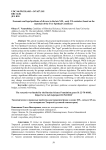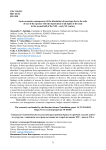Экономическая социология. Рубрика в журнале - В центре экономики

Статья научная
This article examines the practical implementation of the institution of divorce in the Tver province in the late 19th and early 20th centuries, using the preserved divorce cases from the Tver Spiritual Consistory. Special attention is given to the difficulties faced by spouses who wished to terminate their official relationships. The "legal" grounds for divorce are considered, and statistical data on the number of divorces in the Tver province from 1884 to 1914 are provided. The analysis of the dynamics of divorce processes shows that the number of divorces in the Tver province, as well as in the entire empire, was insignificant. However, it is worth noting a gradual increase in the number of divorce cases starting from 1909. By the early 20th century, both in the Tver province and in the empire, the reasons for divorces had radically changed. While in the pre- 20th century period, a significant number of divorces were due to exile to Siberia or the unknown absence of one spouse, starting from 1905, adultery became the main cause of divorces. It can be concluded that the divorce procedure was quite complex, did not meet the demands of the time, and demonstrated the necessity for prompt modernization of divorce legislation. The article shows that in addition to the legal difficulties in the dissolution of marriage associated with the patriarchy of society, significant difficulties were caused by economic consequences. Since the possibilities of the spouses will continue to maintain the level of economic well-being, it will either decrease or may change uncontrollably. The authors note that this determines a significant proportion of informal divorces or serves as an obstacle to marriage.
Бесплатно

Статья научная
The article examines the peculiarities of divorce proceedings based on one of the legislatively permitted grounds, the exile of a spouse to hard labor or settlement with deprivation of all rights, in three provincial provinces – Tver, Tobolsk, and Yaroslavl. An analysis of the funds of the ecclesiastical consistory was conducted, and divorce cases based on the specified motive were identified. Using petitions from representatives of different estates and social statuses, formal aspects and main stages of divorce proceedings were studied, and common mistakes in submitting a "set of documents" were identified. The article also examines the timeframes for considering cases that were resolved positively (divorce) or negatively (denial of divorce). The article concludes with main findings on the similarity of reasons for denial (errors in document submission and the retention of rights by the exiled spouse due to the administrative nature of the verdict) and the timeframes for divorce. Getting a divorce from an exiled spouse in the second half of the 19th to early 20th century was relatively simple; it required complying with all conditions specified in regulatory documents. It is noted that in a patriarchal society, the significance of divorce is also reflected in an economic way. It is shown that the loss of rights and exile affect the aspect of a decrease in social status and a decrease in rank forms of social interaction. It is reflected that the economic aspect of the dissolution of marriage can affect not only the actual issues of financial components, but also the subsequent .
Бесплатно

